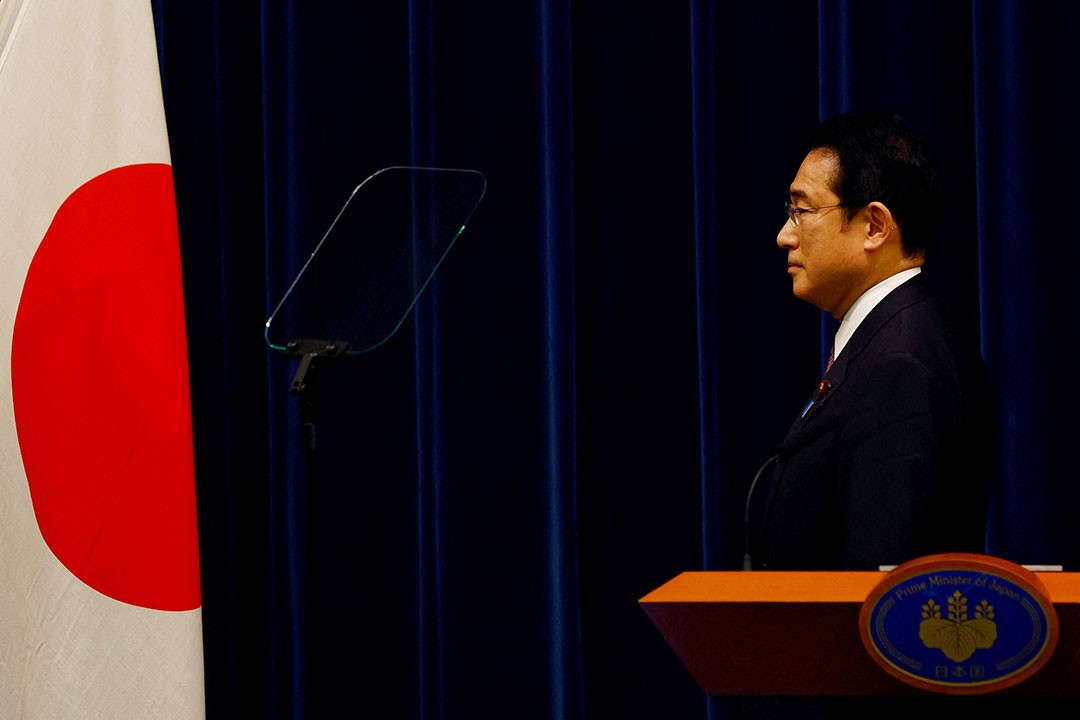Japanese PM to pursue economic and security ties in Philippine visit

By Kyle Aristophere T. Atienza, Reporter
JAPANESE Prime Minister (PM) Fumio Kishida will visit the Philippines this week to hold talks on economic and security cooperation, the Philippine presidential palace said on Tuesday, amid increasing tensions between Manila and Beijing.
The Japanese leader will meet with President Ferdinand R. Marcos, Jr. on Nov. 3 during his two-day visit, it said in a statement.
“The two leaders will hold a bilateral meeting to discuss areas of mutual concern such as political, security, economic and development cooperation, as well as people-to-people ties,” the Philippine Foreign Affairs department said in the statement.
They are also expected to “exchange views on regional and international issues.”
“Through this visit, Prime Minister Kishida will confirm cooperation in maintaining and strengthening a free and open international order based on the rule of law as well as in ensuring a world where human dignity is protected,” Japan’s Foreign Ministry said in a website post.
“He will also affirm collaboration for the Commemorative Summit for the 50th Year of ASEAN-Japan Friendship and Cooperation in December this year,” it added.
The ministry said Mr. Kishida would fly to Malaysia on Nov. 4.
Mr. Kishida’s Nov. 3 visit will be the first under the term of Mr. Marcos, who visited Japan in February.
The two leaders also met on the sidelines of the Association of Southeast Asian Nations Summit in Jakarta in September, along with US Vice President Kamala Harris.
A trilateral relationship among the Philippines, Japan and the US has emerged amid China’s increasing assertiveness in the South China Sea.
Tokyo-based Kyodo News earlier said the two countries were expected to begin formal talks in November for a reciprocal military access agreement that is aimed at facilitating the presence of visiting forces.
During his visit to Japan in February, Mr. Marcos said he was open to such deal if it would help defend Filipino fishermen in Philippine waters. “I don’t see why we should not adopt it,” he said at that time.
Mr. Kishida’s Philippine visit “comes at a time when Japan has been more overt in its desire to play a larger role as a security and development partner in the Indo-Pacific region,” Don Mclain Gill, an international studies lecturer at De La Salle University, said in a Facebook Messenger chat.
“Manila’s intent to not only strengthen ties with Japan but also narrow the functional gap in the US hub-and-spoke system opens up new opportunities for both countries to work closer bilaterally and multilaterally as well amid the increasing geopolitical turbulence in the region,” he said.
Mr. Kishida’s visit to the Philippines is part of a broad effort by Japan, the US and the European Union to boost presence in Southeast Asia, Hansley A. Juliano, a political science lecturer at the Ateneo de Manila University, said via Messenger chat.
“Kishida’s visit is not just to us, he is also visiting Malaysia immediately after. There’s enough to argue that this is less about just the Philippines and more about keeping tabs on allies in ASEAN — an avenue Japan, the US and European Union need to keep on board if they want to contain Chinese encroachment,” he added.
The Philippine government recently dropped funding deals with China for three major railway projects worth P2.8 trillion amid rising tensions between the two countries at sea and days after China’s blocking maneuvers led to collisions with Philippine vessels.
China’s exit in key Philippine infrastructure projects is an opportunity for the Philippines to leverage its growing ties with “materially powerful democratic Indo-Pacific powers” like Japan, Mr. Gill said. He also cited the US, Australia, South Korea and India.
“Economically speaking, Japan’s importance to Philippines development and growth is historical, well-acknowledged and consistent,” he said, noting that Japan is the Philippines’ second-largest trade partner and the largest source of official development assistance (ODA).
Japan has also been active in “initiating trilateral maritime cooperation” with Australia, which is seen as a key player in the Indo-Pacific region amid perceived threats from authoritarian powers, Chester B. Cabalza, founder of Manila-based International Development and Security Cooperation, said via Messenger chat.
“The visit of Prime Minister Kishida bolsters Japan’s primordial idea of a free and open Indo-Pacific region where Japan and the Philippines are two active actors,” he added.



